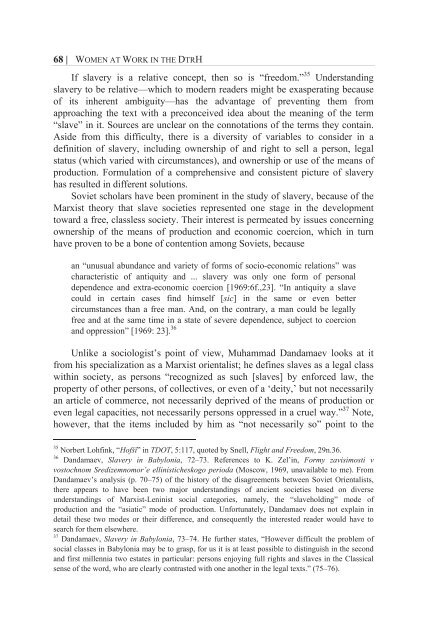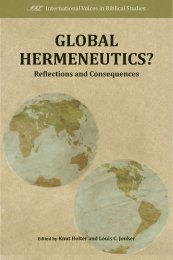Women at Work in the Deuteronomistic History - International Voices ...
Women at Work in the Deuteronomistic History - International Voices ...
Women at Work in the Deuteronomistic History - International Voices ...
Create successful ePaper yourself
Turn your PDF publications into a flip-book with our unique Google optimized e-Paper software.
68 | WOMEN AT WORK IN THE DTRH<br />
If slavery is a rel<strong>at</strong>ive concept, <strong>the</strong>n so is “freedom.” 35 Understand<strong>in</strong>g<br />
slavery to be rel<strong>at</strong>ive—which to modern readers might be exasper<strong>at</strong><strong>in</strong>g because<br />
of its <strong>in</strong>herent ambiguity—has <strong>the</strong> advantage of prevent<strong>in</strong>g <strong>the</strong>m from<br />
approach<strong>in</strong>g <strong>the</strong> text with a preconceived idea about <strong>the</strong> mean<strong>in</strong>g of <strong>the</strong> term<br />
“slave” <strong>in</strong> it. Sources are unclear on <strong>the</strong> connot<strong>at</strong>ions of <strong>the</strong> terms <strong>the</strong>y conta<strong>in</strong>.<br />
Aside from this difficulty, <strong>the</strong>re is a diversity of variables to consider <strong>in</strong> a<br />
def<strong>in</strong>ition of slavery, <strong>in</strong>clud<strong>in</strong>g ownership of and right to sell a person, legal<br />
st<strong>at</strong>us (which varied with circumstances), and ownership or use of <strong>the</strong> means of<br />
production. Formul<strong>at</strong>ion of a comprehensive and consistent picture of slavery<br />
has resulted <strong>in</strong> different solutions.<br />
Soviet scholars have been prom<strong>in</strong>ent <strong>in</strong> <strong>the</strong> study of slavery, because of <strong>the</strong><br />
Marxist <strong>the</strong>ory th<strong>at</strong> slave societies represented one stage <strong>in</strong> <strong>the</strong> development<br />
toward a free, classless society. Their <strong>in</strong>terest is perme<strong>at</strong>ed by issues concern<strong>in</strong>g<br />
ownership of <strong>the</strong> means of production and economic coercion, which <strong>in</strong> turn<br />
have proven to be a bone of contention among Soviets, because<br />
an “unusual abundance and variety of forms of socio-economic rel<strong>at</strong>ions” was<br />
characteristic of antiquity and ... slavery was only one form of personal<br />
dependence and extra-economic coercion [1969:6f.,23]. “In antiquity a slave<br />
could <strong>in</strong> certa<strong>in</strong> cases f<strong>in</strong>d himself [sic] <strong>in</strong> <strong>the</strong> same or even better<br />
circumstances than a free man. And, on <strong>the</strong> contrary, a man could be legally<br />
free and <strong>at</strong> <strong>the</strong> same time <strong>in</strong> a st<strong>at</strong>e of severe dependence, subject to coercion<br />
and oppression” [1969: 23]. 36<br />
Unlike a sociologist’s po<strong>in</strong>t of view, Muhammad Dandamaev looks <strong>at</strong> it<br />
from his specializ<strong>at</strong>ion as a Marxist orientalist; he def<strong>in</strong>es slaves as a legal class<br />
with<strong>in</strong> society, as persons “recognized as such [slaves] by enforced law, <strong>the</strong><br />
property of o<strong>the</strong>r persons, of collectives, or even of a ‘deity,’ but not necessarily<br />
an article of commerce, not necessarily deprived of <strong>the</strong> means of production or<br />
even legal capacities, not necessarily persons oppressed <strong>in</strong> a cruel way.” 37 Note,<br />
however, th<strong>at</strong> <strong>the</strong> items <strong>in</strong>cluded by him as “not necessarily so” po<strong>in</strong>t to <strong>the</strong><br />
35 Norbert Lohf<strong>in</strong>k, “Hofšī” <strong>in</strong> TDOT, 5:117, quoted by Snell, Flight and Freedom, 29n.36.<br />
36 Dandamaev, Slavery <strong>in</strong> Babylonia, 72–73. References to K. Zel’<strong>in</strong>, Formy zavisimosti v<br />
vostochnom Sredizemnomor’e ell<strong>in</strong>isticheskogo perioda (Moscow, 1969, unavailable to me). From<br />
Dandamaev’s analysis (p. 70–75) of <strong>the</strong> history of <strong>the</strong> disagreements between Soviet Orientalists,<br />
<strong>the</strong>re appears to have been two major understand<strong>in</strong>gs of ancient societies based on diverse<br />
understand<strong>in</strong>gs of Marxist-Len<strong>in</strong>ist social c<strong>at</strong>egories, namely, <strong>the</strong> “slavehold<strong>in</strong>g” mode of<br />
production and <strong>the</strong> “asi<strong>at</strong>ic” mode of production. Unfortun<strong>at</strong>ely, Dandamaev does not expla<strong>in</strong> <strong>in</strong><br />
detail <strong>the</strong>se two modes or <strong>the</strong>ir difference, and consequently <strong>the</strong> <strong>in</strong>terested reader would have to<br />
search for <strong>the</strong>m elsewhere.<br />
37 Dandamaev, Slavery <strong>in</strong> Babylonia, 73–74. He fur<strong>the</strong>r st<strong>at</strong>es, “However difficult <strong>the</strong> problem of<br />
social classes <strong>in</strong> Babylonia may be to grasp, for us it is <strong>at</strong> least possible to dist<strong>in</strong>guish <strong>in</strong> <strong>the</strong> second<br />
and first millennia two est<strong>at</strong>es <strong>in</strong> particular: persons enjoy<strong>in</strong>g full rights and slaves <strong>in</strong> <strong>the</strong> Classical<br />
sense of <strong>the</strong> word, who are clearly contrasted with one ano<strong>the</strong>r <strong>in</strong> <strong>the</strong> legal texts.” (75–76).




